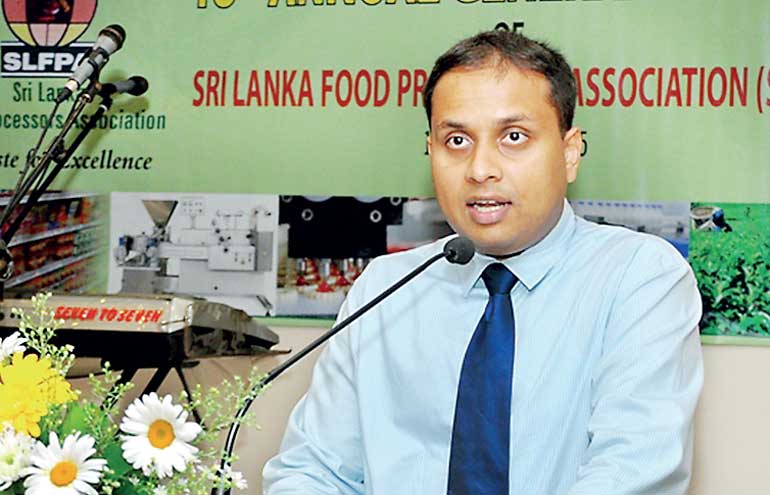Monday Feb 16, 2026
Monday Feb 16, 2026
Friday, 6 November 2015 00:00 - - {{hitsCtrl.values.hits}}
 MA’s Tropical Food Processing CEO Maliek De Alwis was inducted for the year 2016/2017 as President at the Sri Lanka Food Processing Association
MA’s Tropical Food Processing CEO Maliek De Alwis was inducted for the year 2016/2017 as President at the Sri Lanka Food Processing Association
At the recently held Annual General Meeting of the Sri Lanka Food Processors Association a new Executive Committee headed by MA’s Tropical Food Processing Ltd. CEO Maliek De Alwis was inducted for the year 2016/2017.
De Alwis previously was President-elect, and as member of the Executive Committee held other critical volunteer leadership positions within the SLFPA over a number of years.
Commenting on his recent appointment, De Alwis said, “Taking over the helm of the SLFPA is a challenging role for me. Being involved in the association over the years I have great respect for its members and what we achieve. Our industry needs a strong association; we have some key targets for next year. We hope to deliver meaningful dialogue and be a voice for the food and beverage industry, addressing issues and concerns, while committed to the industries’ growth.”
During his tenure De Alwis aims working together with the Executive Committee to put in place SLFPA’s long term new strategic priorities. “Instead of shorter term plans we are setting up longer term plans, getting everybody to work together in envisioning our future as an industry and structuring a road map to achieve these goals,” he stated.
De Alwis elaborated, “We have various focuses: one is helping lift the standards in general, targeting a higher level of export readiness among members, and have safer and better food in the local context.”
Noting how the Association has grown in stature over the years, he said, “The Association started 15 years ago as a representative body comprising of a few food processing companies mostly with medium-sized local companies and now our membership covers a wide selection from small and medium players to large multi-nationals.”
According to De Alwis, “The SLFPA plays a vital role in the F&B industry, collaborating and conducting development projects for the industry, bringing the members together and as a key stakeholder representing the industry at various government panels and policy issue discussions, overall offering direction and leadership to the country’s processed food industry.”
Keen to develop the industry, especially among the ‘smaller and micro player’ he said, “We are looking at setting up a better communication among the entire industry. We are now trying to structure a way to communicate with the smaller and micro players. While the Food and Beverage segment is probably one of the largest portions of the national economy, a vast majority of the sector are micro, small and medium in size. Even when regulations change they are the most affected, usually they are the last to hear about it, and have the least knowledge and capacity to adapt.”
De Alwis also noted that simply concentrating on initiatives directly related to industry development is insufficient, and understanding that consumers are the driving force and the need to recognise market trends is also paramount.
He said, “We are also working on trying to set up a food consumption survey. If conducted yearly on the changing patterns of; what people are eating, not eating, how they are eating, where they are eating etc. this is beneficial to the industry because we know what people want and it is also beneficial to the regulators as it will tell them what policies are likely to be most effective in achieving their goals.”
Commenting on Sri Lanka’s positive position and the industry’s prospects for a brighter future he noted, “We are comparable with most developing nations and we still have a good reputation when it comes to our food hygiene in our region. Demand for convenience and safety is growing everywhere and we can see there are niche markets which Sri Lankan food processors can service well.”
De Alwis noted, “We need continue to strengthen and grow in our role as the voice for our industry collaborating with all stakeholders encouraging industry innovation to meet escalating consumer demands and growing global markets.”
Sarath Alahakoon of Country Style Foods, takes over as President-elect, while Thusith Wijesinghe of Trans Continental Packaging and Commodities and Nadishan Guruge of Mead Lee Trading will take over as Secretary and Treasurer of the Association respectively. Sumith Ponnamperuma (Control Union Inspection), Vasantha Chandrapala (Ceylon Biscuits) and Nishan Perera (CMC Engineering) are the new Vice Presidents.
Throughout the year, SLFPA conducts numerous workshops, awareness and training programs together with Government departments and Non-Governmental organisations on varied topics including food safety standards, hygiene, proper packaging techniques etc.
SLFPA’s annual Pro Food Pro Pack Exhibition is the most comprehensive food, beverage and packing exhibition showcasing local food processors and packaging companies attracting a wide range of stakeholders.
The association’s works closely with, the Institute of Food Science & Technology (IFSTSL) which is the professional body for those involved in the science of food processing, to help provides academic and practical training courses suited to the needs of the local food industry.
Promoting basic level food handler training in the Northern, Eastern and Southern districts is currently being carried out by the SLFPA.